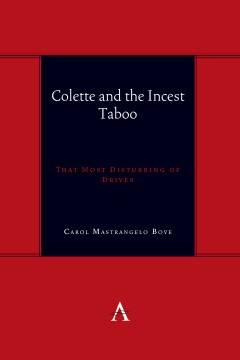Colette and the Incest Taboo
That Most Disturbing of Drives
By Dr.Carol Mastrangelo Bove
Other Formats Available:
- About This Book
- Reviews
- Author Information
- Series
- Table of Contents
- Links
- Podcasts
About This Book
This book makes an argument critical to literary theory and sexuality in 2022. It argues that Colette’s fiction portrays a woman struggling to live in the throes of the incest taboo, understood in its psychological implications for power relations both private and public, then and now. Informed by Julia Kristeva’s work, it approaches Colette’s writing and its translation along with two films via close, psychoanalytic readings. That is, it demonstrates that this version of Kristeva’s psychoanalytic theory, in an accessible form and with emphasis on the psychology of women and social transformation, helps to read Colette for the twenty-first century as well as to show how Kristeva’s theory works.
This volume examines especially writing from the second half of Colette’s life, including the much misunderstood La Maison de Claudine (1922), where the incest taboo surfaces in the relationship of the narrator with the mother. As the book shows, the taboo had already appeared two years earlier in Chéri (1920), in the rapport between the maternal Léa, a woman of a certain age, and the young man, Chéri; finally, in Gigi, the incest taboo characterizes the relations between the young teenager of the eponymous title and her much older uncle figure Gaston. This book also examines two excellent movies, Vincent Minnelli’s adaptation of Gigi in 1958 and Wash Westmoreland’s recent biographical film in 2018, Colette, in this context.
Colette’s writing confronts a problem at the heart of women’s psychology today, shedding light on the parent/child relationship and the ways in which it informs our thinking on female mentality, sexuality, and power relations. Chéri, La Maison de Claudine, Gigi, Minnelli’s adaptation, and Westmoreland’s biopic reveal the problem as a significant element in a changing female psychology and a society in flux.
Reviews
Author Information
Carol Mastrangelo Bové is Professor in English and Gender, Sexuality and Women’s Studies at the University of Pittsburgh, USA. She is also Professor Emerita in French, Westminster College, PA, USA. She has published Language and Politics in Kristeva: Literature, Art, Therapy (2006), Kristeva in America: Re-imagining the Exceptional (2020), and many articles on twentieth- and twenty-first-century literature, film, and literary translation.
Series
Table of Contents
Chapter 1--An Overview of Colette’s Life and Work: Incestuous Desire; Chapter 2--A Woman of a Certain Age : Chéri (1920); Chapter 3--La Maison de Claudine (1922) : Maman Not Claudine; Chapter 4—Gigi (1944) : The Importance of the Uncle; Chapter 5—More Than a Musical, Romantic Adaptation for the Screen: Vincent Minelli’s Gigi (1958); Chapter 6--Wash Westmoreland’s Colette (2018): Willy? Far From the Father of Individual Pre-History
Links
Stay Updated
Information
Latest Tweets



